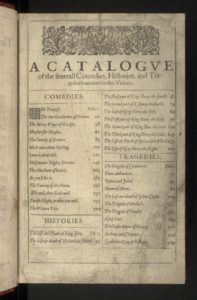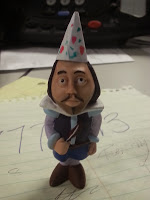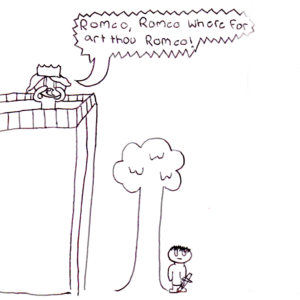 It would be cliche for me to say, “You’re stranded on a desert island with just one book, what book do you want?” but I’ve always wanted to ask the question anyway. I was almost interviewed for a podcast once (never happened) where the guy had a set of questions he asked everybody, and that was one of the questions, and I already knew that my was going to be, “The Complete Works, of course. Everybody says that. But! Which edition??”
It would be cliche for me to say, “You’re stranded on a desert island with just one book, what book do you want?” but I’ve always wanted to ask the question anyway. I was almost interviewed for a podcast once (never happened) where the guy had a set of questions he asked everybody, and that was one of the questions, and I already knew that my was going to be, “The Complete Works, of course. Everybody says that. But! Which edition??”
However, that’s not my question today. I’m stranding you with a First Folio. So it’s got no footnotes or glossary, you know exactly which plays are and are not in it, and no editors over the centuries have had a crack at changing around the spelling and punctuation as they saw fit. You’ve got in your hands as close as you’re going to get to what Shakespeare (via Heminges and Condell) intended.
I’ll also allow you a writing implement of some sort, so you can take notes. You take with you to the island all knowledge of Shakespeare that you currently possess. You’ll be rescued at some point, it’s not like you’re going to spend the rest of your life here, but you have no idea when that will be. Consider this just a forced vacation from life with nothing but Shakespeare to keep you company.
What do you do? Do you read cover to cover? Do you go straight for your favorite play and read it over and over? Or do you go to the ones you’re less familiar with?
For my part, I start with the ones that I’m somewhat familiar with, that I wish I was more so. Richard III tops that list. Maybe Henry V. From there I work my way back to the other Henry and Richard plays, maybe eventually finding my way to King John. I don’t know when I’ll ever get to Merry Wives of Windsor or Measure for Measure, but probably at some point if I’ve become bored with the others. I save my favorites like Tempest and Hamlet and King Lear as a treat, rewarding myself for progress through the other plays.
Who wants to go next?
 Ok, how did I not know about this? Google Arts and Culture has virtual tours (or, rather, panoramic images) of a number of Shakespeare locations including his birthplace, the Globe, Juliet’s balcony, New Place, and others.
Ok, how did I not know about this? Google Arts and Culture has virtual tours (or, rather, panoramic images) of a number of Shakespeare locations including his birthplace, the Globe, Juliet’s balcony, New Place, and others.
 It would be cliche for me to say, “You’re stranded on a desert island with just one book, what book do you want?” but I’ve always wanted to ask the question anyway. I was almost interviewed for a podcast once (never happened) where the guy had a set of questions he asked everybody, and that was one of the questions, and I already knew that my was going to be, “The Complete Works, of course. Everybody says that. But! Which edition??”
It would be cliche for me to say, “You’re stranded on a desert island with just one book, what book do you want?” but I’ve always wanted to ask the question anyway. I was almost interviewed for a podcast once (never happened) where the guy had a set of questions he asked everybody, and that was one of the questions, and I already knew that my was going to be, “The Complete Works, of course. Everybody says that. But! Which edition??”

